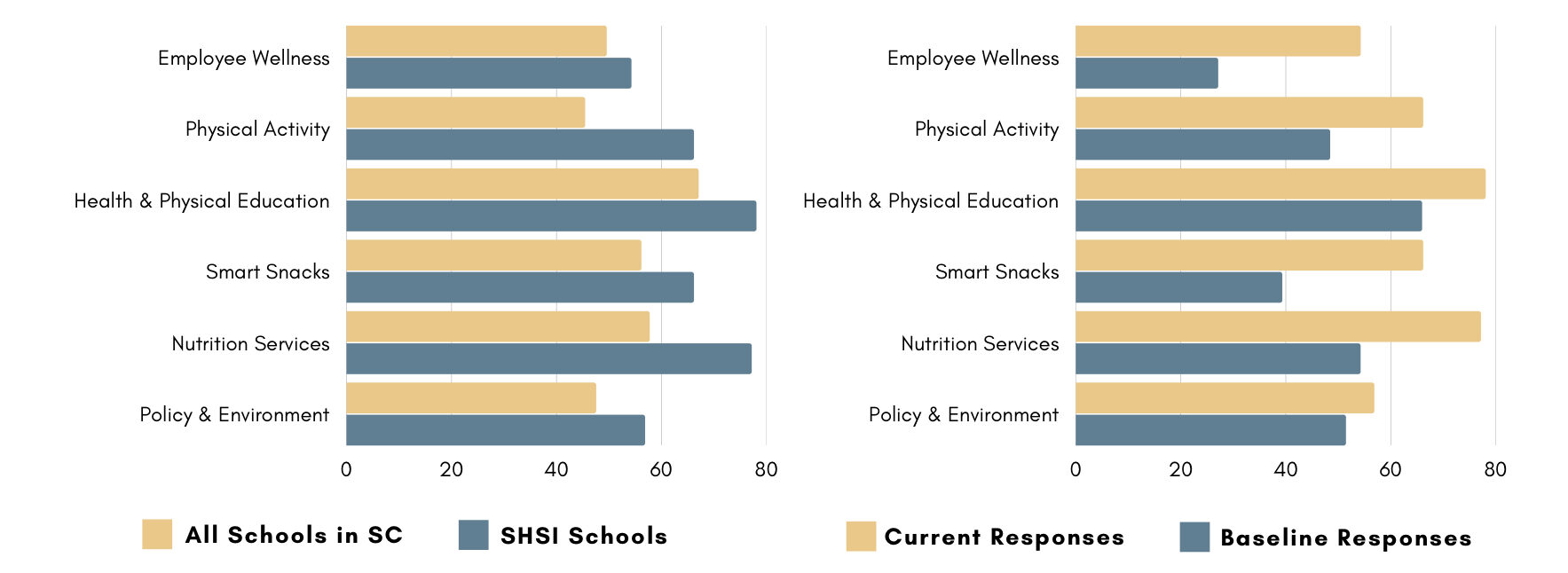Healthy Schools Initiative Update
From 2016 to 2020, the Mary Black Foundation collaborated with Spartanburg County School Districts, PAL: Play. Advocate. Live Well (formerly Partners for Active Living), Alliance for a Healthier Generation (HG), and an evaluation team to pilot a new project. The Healthy Schools Initiative would provide intensive technical assistance and financial resources to support schools in creating environments that foster greater opportunities to access fresh, healthy foods and be physically active.
The Schools
- Arcadia Elementary School- District 6
- Boiling Springs Intermediate School- District 2
- Campobello Gramling School- District 1
- Clifdale Elementary School- District 3
- Lone Oak Elementary School- District 6
- Oakland Elementary School- District 2
- O.P. Earle Elementary School- District 1
- R.P. Dawkins Middle School- District 6
- Woodland Heights Elementary School- District 6
The schools followed implementation strategies that align with the national, evidence-based Alliance for a Healthier Generation Healthy Schools Framework. These strategies focus on policy, systems, and environmental changes. The Healthy Schools Framework consists of an iterative six-step process that all schools go through while also providing flexibility to schools to select their action items based on each school’s context, strengths, needs, and desires.
School Wellness Coordinators
School wellness committees led the work at each school campus. The success of this project is due in large part to the following champions, with special recognition to each committee’s wellness coordinator(s):
- Heather Perry & Michael Guerrero – Arcadia Elementary School
- Travis Perigo & David Wilkie – Boiling Springs Intermediate School
- Catherine Gramling – Campobello-Gramling School
- Kim Goode – Clifdale Elementary School
- Rob DePaol – Lone Oak Elementary School
- Carolina Cabe – Oakland Elementary School
- Laura Dickson – O.P. Earle Elementary School
- Tariq Caudle & Andy Hallman – R.P. Dawkins Middle School
- Paul McGinty – Woodland Heights Elementary School
The cohort of wellness coordinators met quarterly for training and support from the technical assistance team (PAL & HG). One of the components of these quarterly meetings was the opportunity to hear from their peers at other schools. When the wellness coordinators gathered, they shared ideas with each other, they helped each other through challenges, and they celebrated their successes collectively. This cohort became a team that continues to be of support to each other.
Progress
In 2019, seven of the nine schools received the prestigious National Healthy Schools Award, an increase from two schools in 2016. Below are HG School Self-Assessment numbers, with the first chart showing 2019 results comparing the Spartanburg cohort schools (SHSI) to all Healthy School Program schools in South Carolina. The second chart shows the Spartanburg cohort’s baseline assessment results from 2016 compared to the most recent assessment in 2019.

Below are some examples of the policy, systems, and environmental changes that took place over the four years.
Policy:
- Nine schools allow drinking water in classrooms
- Seven schools prohibit withholding physical activity as punishment
- Five schools prohibit using food as a reward
- Two schools removed sugar-sweetened beverages from staff vending machines
Systems:
- Seven schools implemented physical-activity classroom breaks
- Seven schools expanded before- and after-school physical activity opportunities
- All schools promote drinking water
- All schools promote healthy choices in the cafeteria
- One district launched a comprehensive staff-wellness initiative
Environment:
- One new playground was built with over $22,000 leveraged from KaBoom and the school district
- Four walking trails were completed
- One outdoor area that includes a wooded nature trail, an outdoor classroom, herb and vegetable gardens, seating, and play equipment was constructed
- Three staff fitness rooms were installed and one more was approved
- Twelve new or upgraded drinking water access points were added
Effects of COVID-19 Pandemic
The COVID-19 pandemic affected the final steps of the initiative by leading to the shutdown of all schools in South Carolina in March of 2020, the final year of the Healthy Schools Initiative. The participating schools paused their work in March and began to revisit their action plans in late summer/early fall once there was a better understanding of how schools would operate with COVID-19 protocols. Schools were given additional time to use their funds and the technical assistance team regularly shared HG resources to address emerging student, staff, and family wellness needs resulting from the pandemic. The team was able to hold three of the four scheduled school wellness coordinator meetings in the final year but had to cancel the final meeting, which prevented a formal conclusion of the initiative. However, MBF and the technical assistance team met with all of the principals via Zoom to conclude the initiative. Technical assistance is ongoing indefinitely. The Mary Black Foundation and implementation team are incorporating lessons learned into the planning process of a second phase.
Even with the unexpected ending, the Foundation is proud of the team, each school, and their communities for all they accomplished.

